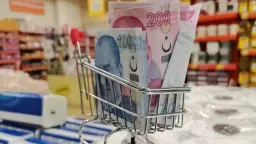The policy Turkey initiated in order to boost exports has come back as an impediment to exports by pushing up costs.
China’s weak export performance in July was the last link to the chain of bad news. The country’s exports increased remarkably weaker than expectations, only by 1 percent year-on-year. The chief reason, as suspected, was the weak recovery in the US and the absence of any in the European Union (EU).
Last month, the International Monetary Fund (IMF) revised the growth forecasts originally announced in April. Unfortunately the revision was downwards. The world economy that grew by 5.3 percent in 2010 and by 3.9 percent in 2011 is expected to grow by 3.5 percent in 2012. This is 0.1 points below what was estimated in April. Through the revision per se was not a major one, note that the new estimate is below the growth rate in 2011. Also, it is anticipated that the overall EU economy will stagnate while the Eurozone will shrink. With this perspective, estimated growth rates for major emerging countries including China, India and Brazil are remarkably weaker than those in 2011.
Drops in exports
One of the main reasons for the sharp economic contraction in Turkey in 2009 was the fall in income and thus import demand of Turkey’s export partners, which in turn pushed our exports down. Yes, overall income of the countries to which Turkey exports will not drop in 2012 as much as it had done in 2009. Yet, developed countries to which Turkey export will not enjoy a remarkable income growth, either.
This phenomenon was reflected on the export performance to some extent in the first half of the year. Though exports increased overall, annual export growth rates were much weaker in 2012 compared to 2011. Given the current circumstances in the world, we have to reason to expect a positive turn in economic performance in the second half of the year. Moreover, according to the data released by the Turkish Exporters Assembly, exports decreased year-on-year in July.
The value of Lira still low
We also must note the fact that this performance was observed albeit the Central Bank’s policy to intentionally lower the value of lira, implemented between the late 2010 and August 2011, roughly. Despite the appreciation in recent months, the value of lira in real terms is still remarkably low compared to October 2010. We all know the mirror reflections of this policy: inflation rate not only reaching two-digit levels but also beyond those in peer countries with which we compete for exports in developed countries’ markets. In other words, the policy Turkey initiated in order to boost exports has ended up hindering exports by pushing up costs. This is a total vicious circle. Seeking to answer the question “how to improve exports” within the perspective of exchange rates alone and locking the debate on this platform is just not useful for Turkey. Less politely, it is harmful.
This commentary was published in Radikal daily on 11.08.2012





